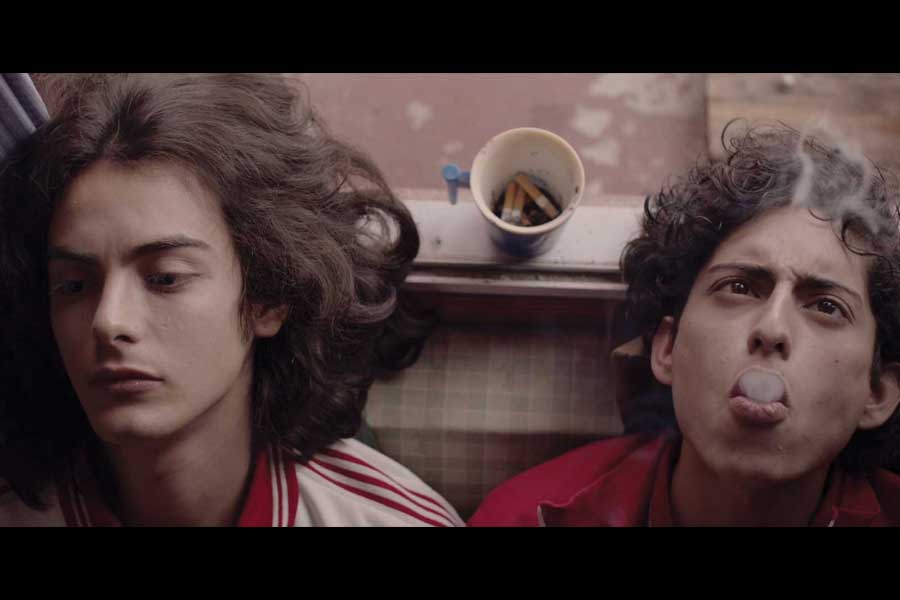Carlos (Xabiani Ponce de León) and Gera (José Antonio Toledano) in “This Is Not Berlin” are two teenagers exploring their sexuality in 1986 Mexico City.
When the boys visit the underground club, Aztec, the androgynous Carlos becomes involved with Nico (Mauro Sanchez Navarro), a queer artist. Meanwhile Gera finds trouble with Ajo (David Montalvo) who is into drugs and sex. This poignant film, which opens August 30 at the Landmark Ritz at the Bourse, will resonate with viewers who have struggled to find their place in the world.
Hari Sama, who directed and co-wrote the film — and plays Carlos’ uncle, Esteban, drew on his own memories and experiences. In a recent phone interview, he chatted with Philadelphia Gay News about making “This Is Not Berlin.”
PGN: Your film makes a point about finding one’s own family, and not caring what other people think. Can you talk about this theme, which is very common in gay culture?
HS: I tried to make this film as honest as possible. It is about what I saw and how I came to be and meet these people. Being an outcast — I probably still am one — I tend to search for people who resonate with who I am and create a family with them. We outcasts search for the structure that we did not find at home, or at school, or in the neighborhood I lived in. I had a need for approval and love. I was trying to portray that.
PGN: How would you describe your teenage life?
HS: I came from a family similar to the one in the film. My father was not as absent, but there was a sense of no connection. I found these people and this artistic outburst and milieu. I wanted to belong there and completely let myself go. But I’m not gay. That was very confusing. I was full of questions. It was intense and joyful but very painful at the same time. I didn’t know where to belong. It took me years to realize I don’t fit into any category. I had to find my own personal voice. And that’s OK.
PGN: Can you talk about creating the intimacy between the men the film?
HS: Nico’s approach to Carlos was very sensitive. Nico is punk and powerful but when it comes to relating to this kid, he’s very delicate and allows himself to be vulnerable. I didn’t have that when I was [Carlos’] age, I had it later. My important male figures — I was really in love with them, not sexually, but in every other way. I wanted this intimacy between two men. It’s one of the most beautiful things — the truest love you can have. We lose that after our teenage years. But when you are younger, you can have a deep level of intimacy.
PGN: What observations do you have about the depictions of masculinity in the film?
HS: I grew up in this suburban place that was super violent. Big gangs. It was how masculinity was “performed.” Finally, I was able to get out of there and find a different way to understand masculinity. Carlos comes from an atmosphere where masculinity is [performed] like that. You’re not allowed to be feminine in any way; that’s seen as a weakness. He’s not gay, but he’s not masculine. I wanted the audience to have this mesmerizing effect I had when I met these people — seeing eyeliner and painted nails and this androgyny. I was fascinated by that. The ‘80s were so cool in that sense. Dressing for a party was a statement and meaningful. I wanted to share that.
PGN: Can you discuss your inspiration for the impressive sequences that showcase art projects and videos?
HS: A lot of different influences. I had my actors meet artists to understand how using one’s body in contemporary art and in physically painful positions was used to express something. Mauro, who played Nico, came up with the idea of them being naked in the streets with “Fag,” “Gay” and “Dyke” written on their bodies.
PGN: What decisions did you make about depicting nudity and sexuality?
HS: I never intended to make a queer film. It just happened. That’s my life. What I wanted to do was be truthful and raw and see the risk they were taking in the ‘80s — being naked in the Mexico City streets in the midst of a terrible dictatorship. You had to be punk at heart to do that. That’s what mattered to me the most.
PGN: Was it painful to recreate aspects of your life on screen?
HS: This is not the first time I’d done it. But it is interesting for me, and I want to continue doing that. I want to make myself vulnerable in my projects. It makes my films more powerful and more meaningful for me. In a way, this film is a gift for the teenage me. I wanted to go back to these issues, look at them, analyze them and share them.
